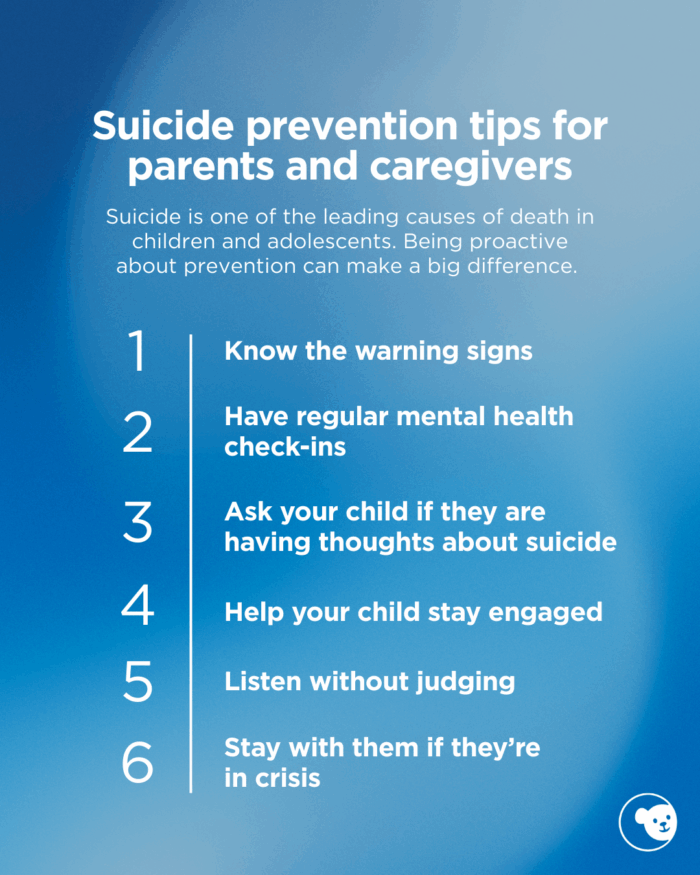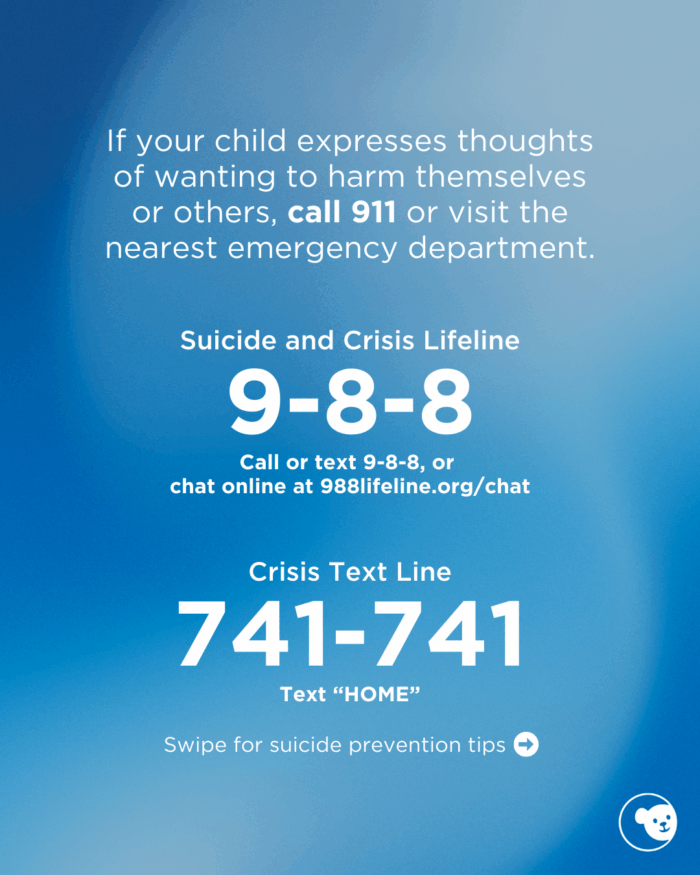By Dr. Vicky Bouche, pediatric psychologist at Rady Children’s Health
Schools, therapists, and doctors often share crisis and suicide hotline information with us, but many people still hesitate to call. This worry is completely reasonable. Most people don’t know what it’s like to call a crisis or suicide hotline, and we have many unanswered questions — who will pick up on the other end? What will they talk to us about? Will they call the police? Who can call in the first place?
If you’re wondering what happens when you call a suicide hotline, read on to learn more.
What are crisis and suicide hotlines?
A crisis hotline is a free, confidential service available 24 hours a day, seven days a week, where people can call to receive support when they are struggling with their mental health. Trained crisis counselors typically staff these hotlines; they listen, provide support, and sometimes help you connect with local resources.
There are several types of hotlines, including suicide prevention lines specifically designed to support people experiencing suicidal thoughts, keep them safe in the moment, and get them connected to crisis resources. Some hotlines are tailored to specific communities—for example, those serving youth, veterans, LGBTQ+ individuals, and Spanish-speaking populations. Many hotlines involve calling over the phone, however, there are some which are text or chat based. With these hotlines, you text the counselor via your phone or computer.
Another type of hotline is called a “warmline.” Warmlines also offer confidential, free phone services for people who want mental health support. However, they do not handle emergency situations. Typically, volunteers or paid peers—people who have personally struggled with mental health—staff warmlines. The goal of a warmline is to support people through mental health struggles, strong emotions, or substance use.
A common question people have is: who can call these hotlines? The answer is…anyone! You can reach out for help yourself, or a friend, caregiver, or teacher can call on your behalf to ask for support.
When should I call?
Whenever you feel you are struggling! Different crisis and warmlines are available to support you based on what you are experiencing. Some people may call after they have tried all their coping skills but are still feeling upset or are experiencing suicidal thoughts. Others may call if they can’t get a hold of their friends or trusted family members, but feel they need to talk to someone. Some crisis line staff have shared that there are recurring callers, who call daily for support. The choice of when to call is up to you!
Fact-checking what calling hotlines is like!
There are a lot of worries around calling hotlines. Crisis line staff generally receive training to ask questions, provide support, coach you through your crisis, and connect you to resources. Naturally, each staff member brings their own style and approach to the conversation. Some callers may feel a strong connection with the person they speak to, while others may not. It is also not uncommon for people to report that their experience with a hotline was not helpful, for a number of reasons.
The Substance Use and Mental Health Services Administration (SAMHSA) shared data from July 2025, which can help us understand what a hotline conversation could be like. Per SAMHSA, their hotline received over 669,000 texts, calls and chats in July 2025. On average, calls lasted 13 minutes, text conversations lasted 55 minutes, and chats lasted 28 minutes. There was a delay in answering, ranging between 33 seconds and 4 minutes. However, wait times may vary depending on when or which hotline you call.
Will my parents or family members find out I called?
In most cases, the answer is no — and here’s why. The crisis, suicide, and warm lines are all confidential services, and they do not have permission to reach out to anyone else about you- unless there is a concern that you are in imminent danger. A crisis counselor considers a situation imminent danger when they believe you might be about to be seriously injured, die by suicide, or be killed. In that case, the counselor can (and should) reach out to a third party for support. Generally, they call the police and have them visit your home for a ‘wellness check.’
Does that mean the police come every time you call a crisis line or hotline? No. Crisis staff cannot contact the police unless they believe you are at immediate risk of serious injury or death. However, they sometimes do contact the police, who may respond—an experience that can be scary and intense, even though the goal is to save lives. The crisis hotline counselor may, at this point, give the police your address so that they can check on your well-being. Police may also use phone call data or your IP (internet) address to obtain your address for a wellness check.
Suicide prevention lines are a resource!
It’s important to remember that crisis, warm, and hot lines are resources that can provide support 24 hours a day and 7 days a week. The goal with a hotline is to help you get through a really tough moment. However, hotlines are a temporary support. If you find that you continue to struggle with your mental health, consider looking for a counselor or therapist to help make long-term changes in your life. To find a counselor or therapist, call the number on the back of your insurance card, or ask your school, work, or doctor for mental health resources.

Crisis Resources
If your child expresses thoughts of wanting to harm themselves or others, call 9-1-1 or visit the nearest emergency department.
988 Suicide and Crisis Lifeline:
Call 9-8-8
Text any message to 9-8-8
Chat online at 988lifeline.org/chat
Crisis Text Line:
Text “HOME” to 741741
Save for later
Download, print or share on social media.






